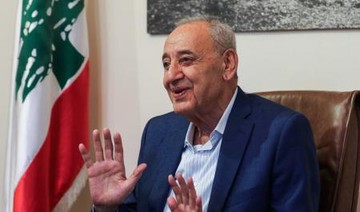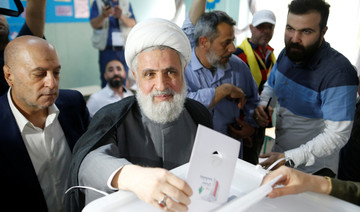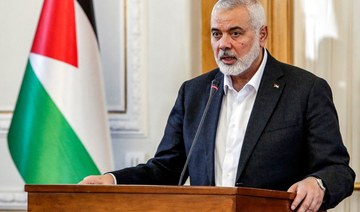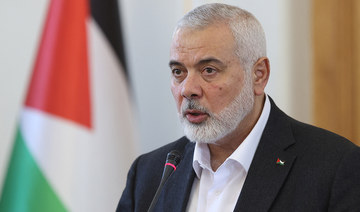BEIRUT: Lebanon’s longtime parliament speaker Nabih Berri often seems like a veteran schoolteacher with a class of unruly students, using threats and jokes and occasional gavel-pounding to keep the assembly in order.
The 80-year-old has held the job for a quarter-century, and is set to be re-elected as speaker for a sixth time on Wednesday, when the new assembly convenes after national elections earlier this month — the first in nine years.
That he faces no challengers, and rarely has over the years, owes much to Lebanon’s sectarian-based and elite-dominated political system, which has mostly kept the peace since the 1975-1990 civil war, but has also spawned political paralysis and endemic corruption.
Berri is seen by some as an embodiment of that system, which shows no signs of changing despite rising discontent. But the parliament speaker, who is one of Lebanon’s most influential and enduring politicians, is also seen as a moderate, unifying figure who lifted his Shiite community’s profile and role in the country’s postwar politics, often acting as mediator among feuding Lebanese factions.
“I don’t believe that there is anyone else who has the characteristics, shrewdness and skills to be parliament speaker more than he does,” said Fouad Saniora, a former prime minister from a rival bloc who had tense relations with Berri during his term.
Lebanon’s political system, built to distribute power among its various sects, mandates a Christian president, a Sunni Muslim prime minister and a Shiite parliament speaker, while the Cabinet and parliament seats are equally divided between Muslims and Christians. As leader of the Shiite Amal movement, which is closely allied with the Shiite militant group Hezbollah, Berri is virtually untouchable. The two parties hold all but one of the 27 seats allotted to Shiites in parliament.
“This is the reality in Lebanon,” said Nabil Bou Monsef, deputy editor-in-chief of the leading daily An-Nahar. “As long as he is the man chosen by his sect to head the parliament, no other sect will veto him as this will lead to sectarian conflict. ... These are the rules of the game.”
Berri’s rise is unusual because he does not come from an established political dynasty. He was born in the African nation of Sierra Leone on Jan. 28, 1938 to a Lebanese trading family with origins in the south Lebanon town of Tibnin. He worked his way up, eventually becoming a lawyer, and says he ended four centuries of feudalism in southern Lebanon.
He was a follower of Imam Moussa al-Sadr, a charismatic Iranian-born cleric who led a Shiite revival in the 1960s that mobilized the long-marginalized community. Berri rose to prominence in 1976, when he became an active member of the politburo of Amal, the military wing of al-Sadr’s movement.
“I was influenced by Imam Moussa al-Sadr in every aspect,” Berri told The Associated Press in a recent interview in his office, which is decorated with an icon of the Virgin Mary and a picture of Berri meeting the late Pope John Paul II.
Berri was elected leader of the Amal movement in 1980 after al-Sadr disappeared while visiting Libya two years earlier. He forged close ties with Syrian President Hafez Assad and remains closely allied to Assad’s son and successor, Bashar.
Amal fighters battled Israeli troops when they invaded Lebanon in 1982, but failed to prevent them from reaching the capital, Beirut. The Shiite fighters later resorted to insurgent attacks, and along with Hezbollah took credit for the Israeli withdrawal in 2000. To this day, Berri says his greatest political achievement was setting up the “resistance.”
Amal struggled during Lebanon’s civil war, however, especially after Iran set up Hezbollah in the early 1980s, drawing Amal defectors into its ranks. The two Shiite groups fought each other on several occasions during the war, but eventually mended ties, and today form the backbone of a Lebanese coalition allied with Syria and Iran.
“When it comes to resistance (against Israel) and goals and everything, we are one body,” Berri said about his ties with Hezbollah. “It is not a Shiite thing. This is a national coalition.”
Berri became known in the West in June 1985, when he helped mediate the release of 39 American hostages after 17 days in captivity. They were held by Shiite extremists who had hijacked a TWA Boeing 727, killed a passenger — US Navy diver Robert Stethem — and demanded the release of 700 Arabs held by Israel.
In the years after the civil war, Berri emerged as a canny mediator who maintained friendly ties with the country’s various factions and worked to prevent them from relapsing into civil war. Known to his supporters as the “Istez,” a title reserved for lawyers, Berri plays an outsized role in naming presidents, forming governments and passing legislation, and his Beirut residence is invariably on the itinerary of visiting foreign dignitaries.
But he is also seen as part of a narrow political elite that has been unable to provide basic services. Nearly 30 years after the civil war ended, Beirut still experiences routine power outages, and a dispute over trash collection in recent years sparked mass protests, organized with the hashtag #YouStink drive, directed against the political class.
Critics accuse Berri of holding up the legislative process when it suits his needs, and his supporters have taken to the streets in violent protests when other factions have challenged him. Earlier this year they blocked Beirut streets with burning tires and trash bins after a leaked video showed the foreign minister calling Berri a “thug” in a closed meeting.
Berri, who has nine children and 26 grandchildren, insists he won’t follow the local tradition of keeping his job in the family, but the octogenarian also has no plans to step down.
“There is no retirement in politics,” he said. “As long as you serve your people and you can work, you will work.”
Speaker’s long tenure embodies Lebanon’s political stasis
Speaker’s long tenure embodies Lebanon’s political stasis
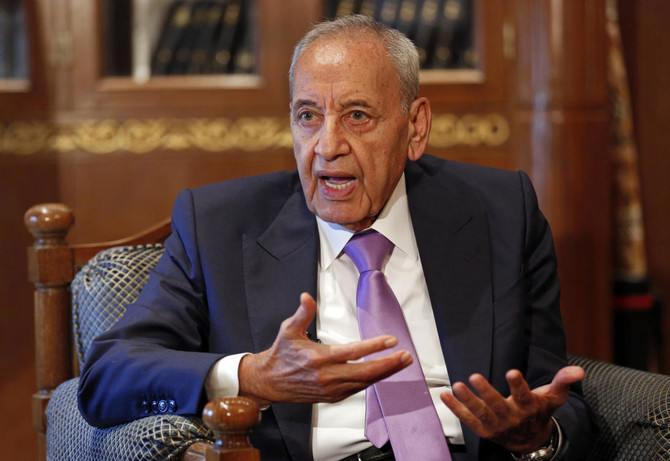
Hamas chief Haniyeh arrives in Turkiye for talks
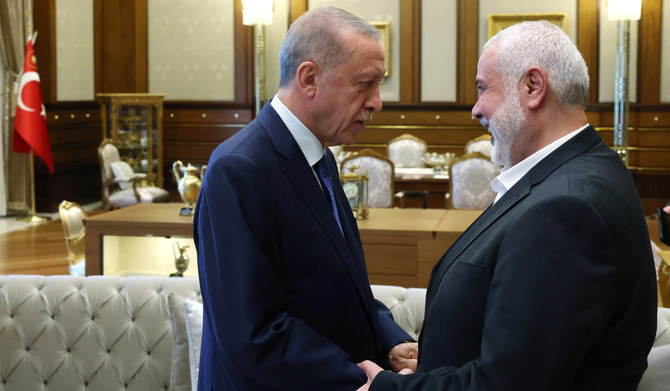
- Fidan said he spoke with Haniyeh, who lives in Qatar, about how Hamas — designated as a terrorist organization by Israel, the United States and the European Union — “must clearly express its expectations, especially about a two-state solution”
ISTANBUL: A leader of Palestinian militant group Hamas, Ismail Haniyeh, arrived in Istanbul Friday evening for talks with Turkish President Recep Tayyip Erdogan as the death toll in Gaza passed 34,000.
A statement from Hamas Friday said Erdogan and Haniyeh would discuss the conflict in Gaza, adding that the head of the group’s political bureau was accompanied by a delegation.
Middle East tensions are at a high after Israel’s reported attack on Iran and Gaza bracing for a new Israeli offensive.
Erdogan insisted on Wednesday that he would continue “to defend the Palestinian struggle and to be the voice of the oppressed Palestinian people.”
But talking to journalists on Friday, he refused to be drawn on the details on the meeting.
Turkish Foreign Minister Hakan Fidan was in Qatar Wednesday and said he spent three hours with Haniyeh and his aides for “a wide exchange of views in particular about negotiations for a ceasefire.”
Qatar, a mediator between Israel and Hamas, acknowledged Wednesday that negotiations to end hostilities in Gaza and liberate hostages were “stalling.”
Fidan said he spoke with Haniyeh, who lives in Qatar, about how Hamas — designated as a terrorist organization by Israel, the United States and the European Union — “must clearly express its expectations, especially about a two-state solution.”
Erdogan’s last meeting with Haniyeh was in July 2023 when Erdogan hosted him and Palestinian president Mahmud Abbas at the presidential palace in Ankara. Haniyeh had last met Fidan in Turkiye on January 2.
The war in Gaza started after Hamas’s unprecedented attack on Israel on October 7 that resulted in the deaths of about 1,170 people, mainly civilians, according to an AFP tally of official Israeli figures.
Militants also took about 250 hostages. Israel says around 129 are believed to be held in Gaza, including 34 presumed dead.
Israel’s retaliatory military campaign has killed at least 34,012 people, mostly women and children, according to Gaza’s Hamas-run health ministry.
Huge blast at military base used by Iraqi Popular Mobilization Forces, sources say

- PMF sources said the strikes targeted a headquarters of the PMF at the Kalso military base near the town of Iskandariya around 50 km south of Baghdad
BAGHDAD: A huge blast rocked a military base used by Iraq’s Popular Mobilization Forces (PMF) to the south of Baghdad late on Friday, two PMF and two security sources told Reuters.
The two security sources said the blast was a result of an unknown airstrike, which happened around midnight Friday.
The two PMF sources pointed out the strikes did not lead to casualties but caused material damage.
PMF sources said the strikes targeted a headquarters of the PMF at the Kalso military base near the town of Iskandariya around 50 km south of Baghdad.
Government officials did not immediately respond to a Reuters request for comment.
The PMF started out as a grouping of armed factions, many close to Iran, that was later recognized as a formal security force by Iraqi authorities.
Factions within the PMF took part in months of rocket and drone attacks on US forces in Iraq amid Israel’s Gaza campaign but ceased to do so in February.
Leaders of Jordan and Pakistan call UAE president to express concern about effects of severe storm

- Leaders passed on their best wishes to the country as it recovers from the storms
DUBAI: The president of the UAE, Sheikh Mohammed bin Zayed Al-Nahyan, received telephone calls from King Abdullah of Jordan and Pakistan’s Prime Minister Shehbaz Sharif on Friday, during which they expressed concern about the effects of the severe weather, including unusually heavy rainfall, that battered parts of the country this week.
They also passed on their best wishes to the country as it recovers from the storms and “conveyed their heartfelt hopes for the safety and prosperity of the UAE and its people, praying for their protection from any harm,” the Emirates News Agency reported.
Sheikh Mohammed thanked both leaders for their warm sentiments, and emphasized the strong bonds between the UAE and their nations.
The UAE and neighboring Oman were hit by unprecedented rainfall and flooding on Tuesday, with more than 250 millimeters of rain falling in parts of the Emirates, considerably more than is normally seen in a year. Dubai International Airport was forced to close temporarily when runways were flooded.
Peshmerga fighter dies in Turkish strike in north Iraq

JEDDAH: A member of the Kurdish Peshmerga security forces was killed on Friday in a Turkish drone strike in the autonomous Kurdistan region of northern Iraq.
Ankara regularly carries out ground and air operations in the region against positions of the outlawed PKK, the Kurdish separatist group that has waged a decades-long insurgency against the Turkish state.
The victim of Friday’s attack died in a drone strike on his vehicle, said Ihsan Chalabi, mayor of the mountainous Sidakan district near Iraq’s borders with Turkiye and Iran.
For decades, Turkiye has operated several dozen military bases in northern Iraq in its war against the PKK, which Ankara and its Western allies consider a terrorist group.
Both Baghdad and the Kurdish regional government have been accused of tolerating Turkiye’s military activities to preserve their close economic ties.
At the beginning of April, a man described as “high-ranking military official” from the PKK was killed in a Turkish drone strike on a car in the mountainous Sinjar region, according to the Kurdistan counterterrorism services.
Turkish President Recep Tayyip Erdogan is expected to visit Baghdad on Monday on his first official visit to Iraq since 2011.
Iraq’s Defense Minister Thabet Al-Abassi in March ruled out joint military operations against the PKK, but said that Turkiye and Iraq would “work to set up a joint intelligence coordination center.”
Middle East in ‘shadow of uncertainty due to regional conflicts’

WASHINGTON: Economies in the Middle East and North Africa face a “shadow of uncertainty” from ongoing tensions in the region, a senior IMF official said.
“We are in a context where the overall outlook is cast into shadows,” Jihad Azour, the International Monetary Fund’s director for the Middle East and Central Asia department, said in an interview in Washington.
“The shadow of uncertainty on the geopolitical side is an important one,” added Azour, a recent candidate for the next Lebanese president.
In the face of the ongoing conflicts in Gaza and Sudan and a recent cut to oil supplies by Gulf countries, the IMF has pared back its growth outlook for the Middle East and North Africa region once again.
FASTFACT
Economic activity in Gaza has ‘come to a standstill’ and the IMF estimates that economic output in the West Bank and Gaza contracted by six percent last year.
The IMF expects growth in MENA of 2.7 percent this year — 0.2 percentage points below its January forecast — before picking up again next year, the IMF said in its regional economic outlook report.
The risks to growth in the MENA region remain heightened, the IMF said, pointing to the danger of greater regional spillovers from the ongoing Israel-Gaza war.
“We have concerns about the immediate and lasting impact of conflict,” Azour said.
The IMF report said that economic activity in Gaza has “come to a standstill” and estimates that economic output in the West Bank and Gaza contracted by 6 percent last year.
The IMF said the report excludes economic projections for the West Bank and Gaza for the next five years “on account of the unusually high degree of uncertainty.”
The IMF cannot lend to the West Bank and Gaza because they are not IMF member countries.
However, Azour said it has provided the Palestinian Authority and the central bank with technical assistance during the current conflict.
“When we move into the reconstruction phase, we will be part of the international community support to the region,” he added.
Azour also discussed the situation in Sudan, where thousands have been killed in a civil war that has also devastated the economy, causing it to contract by almost 20 percent last year, according to the IMF.
“The country is barely functioning, institutions have been dismantled,” he said.
“And for an economy, for a country like Sudan, with all this potential, it’s important to stop the bleeding very quickly and move to a phase of reconstruction,” he added.
The recent Houthi attacks have particularly badly hit the Egyptian economy on Red Sea shipping, which caused trade through the Egypt-run Suez Canal to more than halve — depriving the country of a key source of foreign exchange.
Egypt reached an agreement last month to increase an existing IMF loan package from $3 billion to $8 billion after its central bank hiked interest rates and allowed the pound to plunge by nearly 40 percent.
A key pillar of the current IMF program is the privatization of Egypt’s state-owned enterprises, many of which are owned by or linked to the military.
“This is a priority for Egypt,” Azour said. Egypt needs to have a growing private sector and give space for the private sector to create more jobs.”
“We have an opportunity to re-engineer the state’s role, to give the state more responsibility as an enabler and less as a competitor,” he said.


